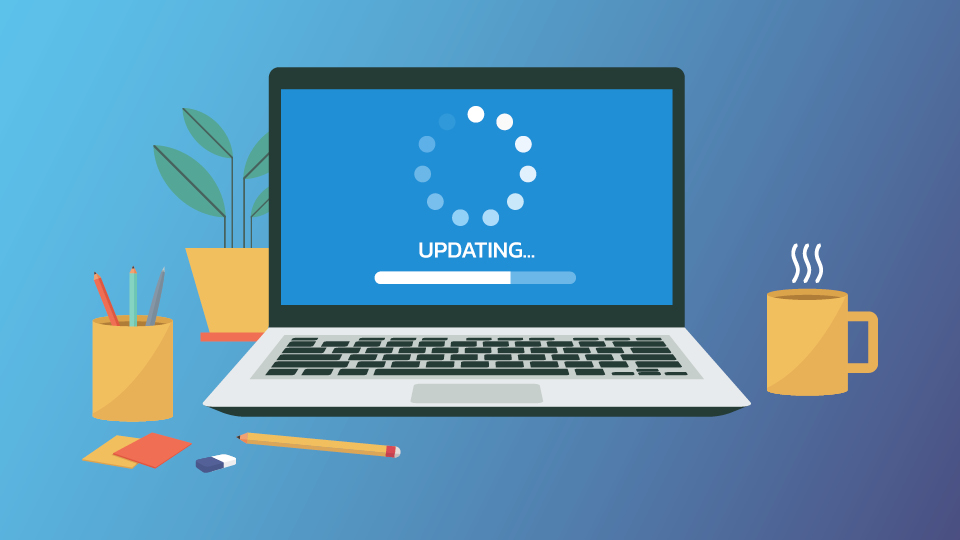Written by:

Grant Yuill
Head of Marketing & Customer Engagement
Legal service providers must ensure compliance with accounting regulations. However, there are several headlines in trade publications about legal firms failing to streamline their practice management. Each headline serves as a sharp reminder of our financial management responsibilities, which are outlined in the SRA Accounts Rules, CLC Accounts Code, or Scottish Accounts Rules, depending on the practice’s specialisms and location.
Accounting Software Updates are Essential for Law Firms
Updating your software is essential for two reasons: Functionality and security are critical aspects of practice management software. Regarding the first one, functionality, you depend on your provider to release updates on a regular basis in response to changes in our industry. If you think this is a given, you couldn’t be more wrong.
Old systems with some providers are not subject to continual product development investment. Usually, there is an ulterior goal at work in these situations, which is to drive businesses to switch to a different or newer software. This situation typically arises as a result of acquisitions and mergers, with the acquisitive or dominant business implementing plans to focus software development resources on the most profitable systems at the expense of everything else. Companies that use such strategies are more concerned about their own revenue figures than yours, even if it means that obsolete functionality will trip you up significantly. This can and does happen. Take the government’s Making Tax Digital project, for example. Many law firms found that their legal software has not been updated to allow them to submit VAT reports directly through the system. Even now, many businesses rely on bridge software, but how long will this be allowed? Any legal firm using software that is no longer a ‘go forward product’ should be able to hear the clock tick.
In terms of security, without regular software upgrades, your door is wide open to hackers. The reason for this is that your software will not get updated for security threats such as phishing, malware, man-in-the-middle, denial-of-service, and spyware, all of which are becoming increasingly sophisticated and widespread. However, it does not take an experienced cyberattacker to breach the security of obsolete and potentially unsupported software.
Cyberattacks can have terrible consequences for financial data security. In worst-case scenarios, it might lead to the collapse of a business. Financial losses can take various forms, ranging from the actual theft of funds from your bank account to the significant expense of downtime if operations are halted during the breach or the forced payment of ransoms to resume operations.
The effects of a breach might be far-reaching, depending on its nature and impact on legal industry practices. A good example of this is the loss of client data. It is important to note that the maximum fine for breaking GDPR data protection obligations is £17.5 million, or 4% of global yearly turnover. If there is one item that might jeopardise a firm, this is it.
The consequences do not end there; they can also affect the firm’s financial data management. Even though financial losses can be recovered, cyberattacker violations can have such a severe impact on the reputation that customer trust is jeopardised. Loss of business as a result of reputational damage can have an equal, if not greater, impact on the bottom line.
Constant Change in Legal Practice
Accounting rule changes are a natural extension of the theme of keeping the software functionality up to date. Looking back over the last 18 months, our industry has faced amended SRA Accounts Rules, new Making Tax Digital legislation, and increased anti-money laundering regulations in the form of the 5th AML Directive.
These three cases alone highlight the ever-changing nature of legal accounting, and bookkeeping in general. To account for any change in legal accounting processes, software features must be improved or introduced to keep finances on track, protect client funds, and remain compliant with regulators both inside and outside the sector. Needless to say, outdated software cannot make promises to produce these types of results.
It is important to mention at this point that not all account packages are the same, even those that include regular infusions of product development investment. In terms of fee-earning capability, some systems are amazing, but they don’t have a strong base on which cashier staff can manage accounts. Other systems are generic and not designed specifically for legal firms. These are also risky since they fail to properly tackle the complexities of law firm accounting.
Aside from assisting in compliance with new accounting standards and regulations, your software should have tools for improving business intelligence, monitoring historical performance, forecasting cash flow, and growing your organisation. So, when reviewing your software options, in addition to analysing the frequency of updates that follow established rules, look into the audit trail mechanisms and reporting suites.
Staff Training is Essential
If you’re privileged enough to have a high-quality legal accounting system, make sure your staff is taking full advantage of all of its features. Not only will this provide the highest return on your software investment, but it will also ensure that you are using the product exactly as intended. In other words, your financial management procedures are flawless.
Nobody wants to be the next front-page headline about a legal practice being brought down by their software, especially if it is entirely their fault. Set aside funds for the software training. You will never regret spending the money.
The idea applies to staff members at all levels, including solicitors and fee earners who record time, conduct AML checks, and log disbursements; cashiers who manage ledgers, reconcile bank accounts, bill clients, and submit invoices and VAT returns; COLPs and COFAs who maintain breach registers and show ongoing compliance; and senior leadership teams who oversee finances, manage, and develop their businesses. A single weak link in the chain can lead to disaster.
Compliance Is Key In The Legal Business
Compliance with legal accounting regulations is essential but obsolete software might jeopardise your company’s operations. Noncompliance, whether intentional or due to flaws in management software, can have major financial and reputational consequences.
Denovo’s legal account software for UK law firms is designed to keep your business compliant, secure, and efficient. Our software solution, which receives regular updates and has innovative capabilities, assists you in navigating complex legislation and protecting your firm’s financial data.
Contact Us Today!
If your present software is not up to date, it’s time to upgrade! Denovo provides customisable cloud-based legal software that combines a case management system, legal accounting, and outsourced cashroom services into a single platform streamlining workflow for your law firm.
Book a demo today! Call 0141 331 5290 or visit our website. Denovo can help transform your law firm!















